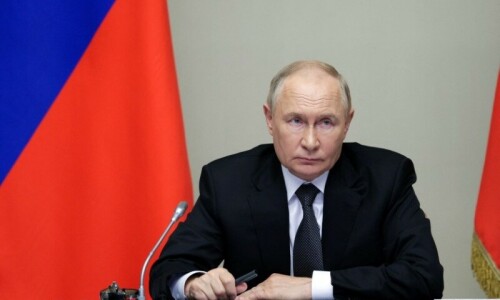Ukrainian President Volodymyr Zelensky called on the outgoing US administration of President Joe Biden on Sunday to help convince Nato members to invite Ukraine to join the alliance, as Ukraine’s war with Russia enters an unpredictable new phase.
Kyiv wants Nato members to issue an invitation at an alliance meeting in Brussels this week as the invasion grinds toward its three-year mark and Russia makes battlefield gains.
Zelensky spoke to reporters in Kyiv alongside the new president of the European Union’s council of member states, Antonio Costa, who travelled to Ukraine on his first day in office to show support for Kyiv in its war with Russia.
The Ukrainian leader, who has been calibrating Ukraine’s positions before Donald Trump succeeds Biden in January, acknowledged that some Nato allies were still wary of inviting Kyiv to join the alliance, which obliges all members to aid each other if attacked.
“There are two months left in the current administration in the United States,” he said. “They have influence on those few European sceptics of our future (in Nato).”
Trump has criticised the scale of US support for Ukraine and has promised to end the war quickly, without saying how.
Russia and Ukraine have both interpreted this as increasing the likelihood of peace talks, which are not known to have been held since the first months after Russia’s full-scale invasion in 2022.
Both foes have tried to improve their positions on the battlefield and among diplomatic allies.
Russian advance
Moscow’s troops have been capturing village after village in Ukraine’s east, part of a drive to seize the industrial Donbas region, while Russian airstrikes are targeting a hobbled Ukrainian energy grid as winter sets in.
In November, the Biden administration granted Ukraine permission to use Western weapons to strike further into Russian territory. Moscow responded by attacking Ukraine with a new intermediate-range ballistic missile and has threatened further strikes on government sites in Kyiv.
Kyiv has long demanded Moscow withdraw all troops from its territory and said Ukraine must be granted guarantees for its security comparable to Nato membership to prevent Russia from attacking again.
Moscow, which controls nearly a fifth of Ukrainian territory, demands recognition of its annexation of Ukrainian land and permanent neutrality for Ukraine.
In an interview last week, Zelensky floated the idea of his country being granted Nato membership even while Russia occupies some captured territory, a solution he said could end the “hot stage” of the war.
In his remarks on Sunday, Zelensky clarified that any invitation to join the alliance must extend to all Ukrainian territory, even if the alliance’s collective defence agreement might not operate in areas occupied by Russian forces.
“There can be no Nato invitation to (only) a part of Ukrainian territory,” he said, saying an invitation extended only to parts of Ukraine would amount to recognising that other parts were no longer Ukrainian.
Costa, who visited Ukraine along with the new EU foreign policy chief and the bloc’s head of enlargement on the day they all took office, said the EU had “stood with you since the very first day of this war of aggression, and you can count on us to continue to stand with you”.
“These are not just words,” added Costa, a Portuguese former prime minister who replaced Charles Michel as president of the European Council and chair of EU summits.
Costa said Ukraine’s process of joining the EU was marked by “a sense of urgency” and the bloc could take steps to integrate Ukraine before its entry, such as coordinating mobile phone roaming rules and letting some goods into the single market.
“We cannot manage this process as business as usual because it is a geopolitical choice,” he said.

















































